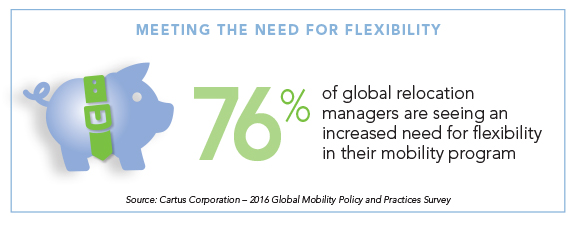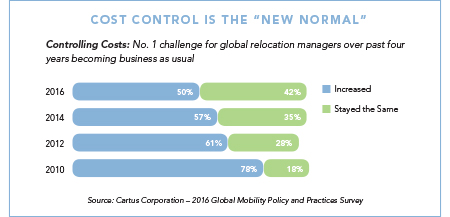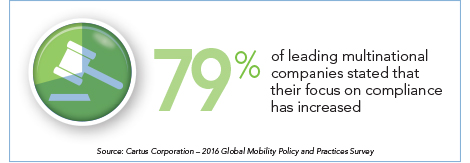
Changing Employee Needs Driving a New Look For Overseas Job Transfers
PR Newswire
DANBURY, Conn., Dec. 5, 2016
DANBURY, Conn., Dec. 5, 2016 /PRNewswire/ -- As the global relocation landscape continues to change, leading multinational companies are navigating through it with new approaches that help them get their preferred employees to take global transfers while controlling costs. For the seventh time since 2002, Cartus Corporation has released its Trends in Global Relocation: Global Mobility Policy and Practices survey report, which outlines the challenges companies are facing, the solutions they are employing and where they are sending their transferring employees. Sponsored by the National Foreign Trade Council (NFTC), the study elicited responses from 176 mobility managers – representing nearly 10 million employees, globally – on dozens of topics. Below are just three of multiple key findings that can be found by reading the full report.
Experience the interactive Multimedia News Release here: https://www.multivu.com/players/English/7988051-cartus-global-relocation-trends-survey-2016
76% of companies need more flexibility in #mobility programs. No.1 reason? Cost control! @Cartus
1. The Look of Overseas Job Transfers Continues to Change as Companies Seek Flexibility
As companies strive to provide their internationally transferring employees with an improved relocation experience – while still controlling costs – they are seeing the need to build more flexibility into their mobility programs.

- 76% of this year's survey respondents reported an increase in the need for flexible approaches to job transfers, driven increasingly by generational needs and changing expectations, as well as by cost concerns.
- The traditional forms of assignment – long and short term – involve sending employees out to a host location and bringing them back after the assignment is completed. However, survey respondents report that the top way in which they are moving employees now is permanent – one way – moves. In these cases, return trips upon completion of an assignment are handled separately.
- Despite, this, however, survey findings suggest that long-term assignments are still the best way to achieve certain company goals, with 81% of U.S. respondents expecting long-term assignment activity to increase or stay the same over the next two years.
2. Cost Control Becoming the "New Normal"
Since 2010, survey respondents report that while their companies' cost control pressures aren't necessarily increasing, they aren't decreasing either. This leaves them with a "new normal" in terms of cost control focus. What is changing is how they are seeking to trim those costs.

- In Cartus' 2014 survey, the No. 1 area of change being considered to control cost was policy. This year, outsourcing topped the list of ways to save.
- 71% of current respondents say they have already started to outsource and the remaining 29% say they are considering doing so.
- Outsourcing for relocation not only gives companies access to industry-specific technology and expertise, but frees human resources and mobility managers to contribute to more strategic initiatives, such as linking talent with mobility to accomplish company goals.
3. Compliance Issues are a Growing Concern for Companies
Seventy-nine (79) percent of survey respondents stated that their organizations' focus on compliance has increased in the past two years. As this focus shifts, it's important for companies to consider their level of care for employees who "don't know what they don't know" about tax, legal and immigration compliance, as well as safety and security, and even appropriate preparation prior to undertaking an international assignment.

Read the Report
Request the full report, the seventh in Cartus' series of policy and practices surveys that began in 2002, or view highlights of the report here.
Quotes:
Matt Spinolo, EVP Global Client Services, Cartus Corporation:
"For the last 14 years, Cartus has been doing research with hundreds of our clients around what employers and international assignees need to have for successful global programs. This year our Global Mobility Policy and Practices Survey highlights the ongoing challenges and conflicts of cost containment and flexibility. These areas of concern have been growing since the most recent recession, and IT-driven mass customization came onto the scene at about the same time."
"Rounding out our top three challenges, compliance is again in the spotlight. While continuing deployment of IT resources and methods has helped employers understand more of what is going on, and has helped employees deal with new and novel experiences, it has also helped tax and immigration authorities to know who is where, when, and for how long. More data means more information, more guidance, and more compliance reporting."
"The high prevalence of permanent (one-way) global transfers among companies potentially indicates a growing recognition of the importance of global work experience, especially among Millennials, who appear willing to get the experience in other ways than the traditional long-term 'expat' package."
Bill Sheridan, Vice President, IHR Services, National Foreign Trade Council:
"The continued focus on managing costs, regardless of industry, is a theme we constantly hear from our members. The focus on cost makes it even more important for companies to pay attention to return on investment, including preventing employees from leaving companies once they repatriate. Companies need to see assignments as an investment for the enterprise as well as for the expatriate."
"It's interesting to note that, despite the fact that they are the most costly assignment type, long term assignments are still of major importance, especially as enterprises expand into new markets in Africa, Southeast Asia and other wide ranging locations."
About Cartus
For more than 60 years, Cartus has provided trusted guidance to organizations of all types and sizes that require global relocation solutions. Providing the full spectrum of relocation services, including language and intercultural training, Cartus serves more than half of the Fortune 50 and has moved employees into and out of 185 countries. Cartus is part of Realogy Holdings Corp. (NYSE: RLGY), a global leader in real estate franchising and provider of real estate brokerage, relocation and settlement services. To find out how our greater experience, reach, and hands-on guidance can help your company, visit www.cartus.com; read our blog; or click www.realogy.com for more information.
| Contact: | |
| Alison Sedney at 203.205.3739 | LisaMarie DeSanto at 203.205.8544 |
| Email: alison.sedney@cartus.com | Email: lisamarie.desanto@cartus.com |
To view the original version on PR Newswire, visit:http://www.prnewswire.com/news-releases/changing-employee-needs-driving-a-new-look-for-overseas-job-transfers-300372327.html
SOURCE Cartus Corporation

Mehr Nachrichten zur Anywhere Real Estate Inc Aktie kostenlos abonnieren
(Mit der Bestellung akzeptierst du die Datenschutzhinweise)

Hinweis: ARIVA.DE veröffentlicht in dieser Rubrik Analysen, Kolumnen und Nachrichten aus verschiedenen Quellen. Die ARIVA.DE AG ist nicht verantwortlich für Inhalte, die erkennbar von Dritten in den „News“-Bereich dieser Webseite eingestellt worden sind, und macht sich diese nicht zu Eigen. Diese Inhalte sind insbesondere durch eine entsprechende „von“-Kennzeichnung unterhalb der Artikelüberschrift und/oder durch den Link „Um den vollständigen Artikel zu lesen, klicken Sie bitte hier.“ erkennbar; verantwortlich für diese Inhalte ist allein der genannte Dritte.




